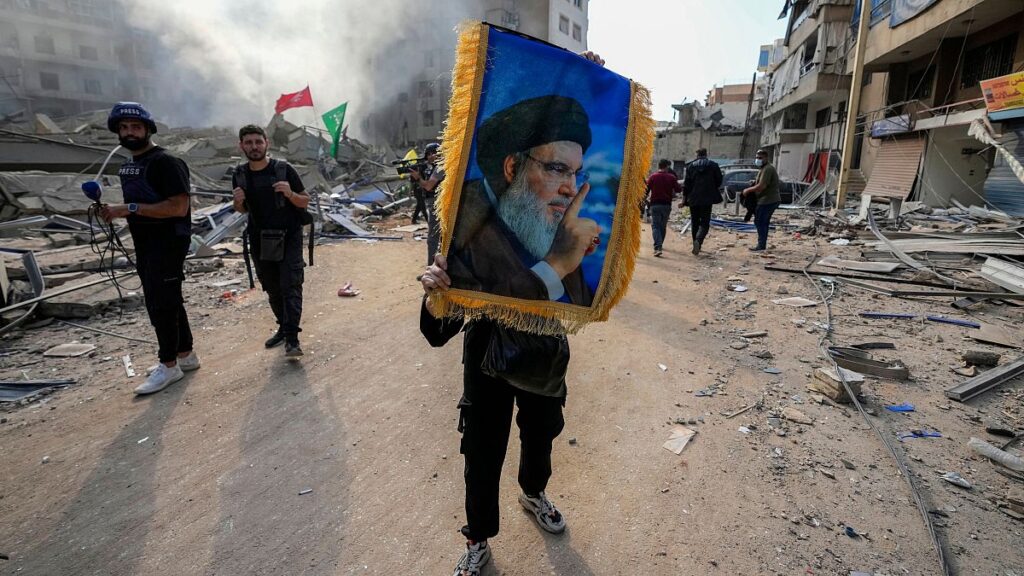While the Israeli assault has decimated its leaders, Hezbollah, one of the most entrenched and resilient militant groups in the Middle East, is struggling to stay united.
As the United States continues its efforts to finalize a ceasefire agreement between Israel and Hezbollah, Lebanon’s new militia leader, Naim Qassem, this week delivered one of his first speeches since taking over from office at the end of October.
He attempted to strike a conciliatory tone by declaring that Hezbollah“had accepted the Biden-Macron ceasefire agreement on September 23”but he blamed his Israeli rivals for the failure, recalling that they had assassinated the group’s historic leader, Hassan Nasrallah, just four days later.
However, Mr. Qassem stood defiant despite the enormous human and military cost Hezbollah has suffered in recent months, presenting Hezbollah fighters with a stark choice: “Victory or Martyrdom”.
But despite Qassem’s bellicose message and confident tone, many experts in the region wonder whether Hezbollah’s famous resilience can last much longer.
Michael Stephens, a Middle East expert at the London-based Royal United Services Institute, told euronews that the Hezbollah had been seriously affected by the Israeli campaign and that a fundamentally different organization emerged.
“The days of big funerals and big elections of leaders are over,” he declared. “Everything they do will be penetrated by Israel, which makes them extremely dangerous.”
Kenneth Roth, former director of Human Rights Watch, who has closely followed events in the region, told euronews that the leadership of Hezbollah “was decimated”.
This year, Israel has killed several senior members of Hezbollah’s political and military wings, including six leaders in the same week as Mr. Nasrallah’s assassination. They included the deputy head of the political council, Nabil Kaouk, and the commanders of the militia’s drones, missiles and elite combat forces.
Mr. Stephens speculated that, based on the Hezbollah leader’s own words, Mr. Qassem himself is more likely to experience “martyrdom” than victory.
“He won’t be around long. I guarantee you that next year, this time, he won’t be here anymore.”said Mr. Stephens, concluding that“They’re in trouble.”
Who is Naim Qassem?
Born into a Shiite family in southern Lebanon, Sheikh Naim Mohammad Qassem grew up in Beirut and studied theology under the prominent Shiite cleric Grand Ayatollah Muhammad Husayn Fadlallah, whose sermons have been cited as a source of major inspiration for Hezbollah.
Naim Qassem began his career as a chemistry teacher, but never strayed from radical Shiite politics and joined the Amal Movement Shiite militia in the 1970s, before leaving in 1979.
He then became a founding member of Hezbollah in the 1980s and was named deputy secretary general in 1991, a position he retained until he was elevated to head the organization this year.
However, many Middle East observers question Mr. Qassem’s real authority.
“This guy is very low in the hierarchy”Mr Roth told Euronews.
Mr. Stephens agreed, saying that Hezbollah “descends to people of the third rank” and suggesting that the “regional commanders” could now control a patchwork of localized battalions, with Qassem acting more as a ceremonial figurehead.
A “toothpick”
Given that Israel has eliminated much of Hezbollah’s central leadership – as well as more than 3,500 fighters – since hostilities began following the October 7 attacks and Israel’s military campaign in Gaza, some ask how this once very well organized militia will actually be able to enforce a ceasefire agreement by its own fighters.
As Michael Stephens says, “if they don’t, Israel will continue to mow them down, and they’re doing pretty well at it, even if at a horrible, terrible cost.”
The US proposals are supposed to allow Israel to continue its targeted strikes inside Lebanon, which has been widely criticized for its character “unilateral”.
Iran, Hezbollah’s main international backer, also reportedly pushed the group to accept the terms of the deal. In recent months, Israel has struck numerous targets in Iran and the government in Tehran does not want to suffer further attacks. And because Hezbollah’s capabilities are sharply reduced, the group’s usefulness as Iran’s proxy is significantly diminished.
“Hezbollah was used as a sledgehammer to dissuade Israel from attacking Iran,” explains Mr. Roth. “That hammer turned out to be a toothpick.”


